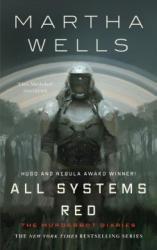
We all struggle to figure out who we are. It’s no different for a robot that’s managed to secretly override its governor unit and develop self-aware independence. The artificial construct, made up of regenerative organic and artificial parts, privately calls itself Murderbot out an emerging sense of guilt it tries to squash by watching hours of mindless TV. But even that distraction cannot keep a socially awkward, self-conscious entity from developing feelings about the humans it serves. That internal conflict is so realistic it is easy for the reader to forget it is an artificial construct narrating. Murderbot’s deadpan humor keeps the 2017 novella from bogging down and raises it well above a familiar action/corporate malfeasance plot. The novella is the first of a five-part series, all available through PPLD, with a full-length novel, Network Effect (May 2020) continuing Murderbot’s journey of self discovery and soap operas. A sixth series entry is scheduled for April 2021.
Honors: 2017 Nebula Award for Best Novella, 2018 ALA/YALSA Alex Award, 2018 Hugo Award for Best Novella, 2017 Philip K. Dick Award finalist.
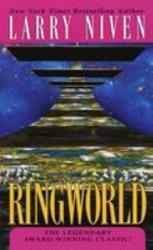
It can be difficult to judge a book, especially one as critically acclaimed as Ringworld, with 50 years of scientific and societal progress between when it was written and today. On the one hand, there are many scientific concepts explored in this book that we almost take for granted in modern sci-fi. On the other hand, the stink of 1970s misogyny doesn’t age very well, and this book is a prime example. Even today, sci-fi authors are still trying to dig out from the sexist tropes that books like this perpetuated throughout the genre. It’s a complicated, uphill battle, but we’re trying to be better than this.
For 1970, I do have to admit that the science presented here is relatively revolutionary. Unfortunately, the descriptions were occasionally a bit dry and felt more like reading a textbook than a sci-fi adventure. I could appreciate how Niven described the indescribable scale of something as massive as the Ringworld. Additionally, the alien races were well-rounded and had complex physiologies and backstories that made the group dynamic entertaining to read. However, the only thing well-rounded about the women in this book were their bodies.
Aside from the considerable age difference between the two romantic leads being an acceptance of pedophilia, it’s clear that Niven only thought of women as objects. This is disappointing because the story could have been more interesting if the female characters had any agency other than being driven by pleasure or luck. I have to recognize that this book is still a snapshot of its temporal circumstances, but that doesn’t necessarily excuse it in today’s society. Acknowledging that it’s from the 1970s, modern works should be more aware of these flaws when using such a pivotal science fiction book as a base for today’s books.
Some great science with not-so-great misogyny, I give Ringworld 3.0 stars out of 5.
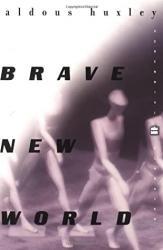
Brave New World, written by Aldous Huxley, is a personal interpretation of society’s attitude towards technology. It takes place in a future, either dystopian or utopian, where technology reigns supreme, and humans are created in a lab. It offers commentary on where humanity’s values are placed, and where they should be placed. The characters have to choose whether or not conformity is the best option, and whether numbing the pain is better than understanding the suffering. Written in the 1930s, Huxley has a surprisingly modern style and understanding, and knowing that he was unsure of the future makes it an even more exciting book.
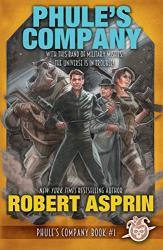
Phule’s Company combines humor and a great amount of detail in a single book. It also contains a good amount of growth mindset. Even though it's a novel, I think anyone could learn Growth Mindset from this. Though the humor is hard to see, it really is funny in a lot of ways. Some of the names are clever versions of household items, such as duct tape. Overall, this is an excellent book for anyone looking for a sci-fi.

"Universal Love" is 11 short stories set in the near future, showing how people use technology to navigate relationships. In one story, a widower signs up for a program to re-create his deceased wife, only to find out his daughters downloaded a fictitious history from romance novels. Another story has testimonies of why people use on-line dating services. A third story explores the relationship of two robotic children who try to act like human children, even to the point of having real life problems and addictions. An interesting look at technology and how it could be in our not far future of how we relate to each other. One constant remains, and that is our need for human interaction, no matter the media we use to get it.
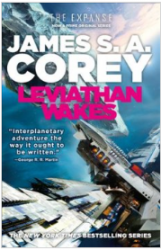
For years, my co-worker has been suggesting that I read the Expanse series of books. Before I finally got around to the audiobook for Leviathan Wakes, I took a slight shortcut and watched the television series on Amazon. This came in handy because I was able to pick up this book and immediately be able to visualize what was happening and who the characters were. Sure, the actors cast in the show are slightly different from their literary counterparts. Still, overall there was a lot in this book that I had already experienced with the television show.
I will applaud this book for being a hard science fiction story, but not shoving the calculations in the reader’s face. Sure, The Martian did an excellent job of explaining all the scientific challenges of interplanetary travel. However, Leviathan Wakes took this a step further and created a universe that’s still controlled by the same physical laws we encounter in the real world. Unless you know what you’re looking for, you’d never realize that the little ways to make life livable in outer space would manifest in the forms presented in this series. Basically—to quote the title of a Heinlein book—Gravity is a Harsh Mistress.
And while the television show had lots of different plotlines to follow through its four seasons, I do like how Leviathan Wakes focused on just two main characters and the discovery of the Protomolecule. Although—even though both characters came from different backgrounds—I would have expected their reactions to situations would have been more drastically different than they were. Still, even if both Miller and Holden felt like very similar characters, they were both written well enough that it was an entertaining ride, nonetheless.
A perfect blending of story and hard sci-fi, I give Leviathan Wakes 4.0 stars out of 5.
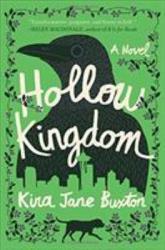
This debut novel is a refreshing romp through the Apocalypse narrated by a foul-mouthed domesticated crow whose only knowledge of the world is TV. This mash-up of "The Incredible Journey" and "The Walking Dead" has an environmental message, focusing on humankind's increasing disconnect from the natural world. You may want to reconsider all those hours of screen time. But do read this novel, which while a tad long, chronicles the adventures of S.T. (not a library appropriate name) and his heroic steed, the dim-witted dog Dennis. The crow tries to save humankind, learns about himself and the natural world in a frightening new Seattle featuring an emerging predator.
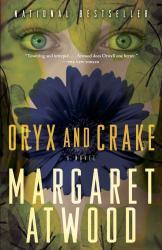
"Oryx and Crake" follows the character Snowman who is seemingly the last surviving human on Earth as he recounts the events that led up to his dystopian present. In this speculative fiction novel, animals are genetically modified to harvest organs for human transplant and spliced together to create fantastical hybrids like “rakunks” that are part racoon and part skunk. In addition, a new human breed is created to be physically flawless and void of normal human characteristics like envy or jealousy. This incredibly thought-provoking book challenges the reader to think about our present, and the choices we make that may lead us down a similar apocalyptic path. For example, it forces us to question how far are we willing to go with genetic modification. Although Atwood deals with serious topics in this book, she addresses them with such humor and over-the-top situations that the book is remarkably enjoyable. Furthermore, the characters of Oryx and Crake are some of my favorite literary characters.
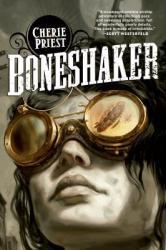
Boneshaker is the novel that kicks off Cherie Priest's "Clockwork Century" series - one of the most widely acclaimed book series in the Steampunk genre. Boneshaker explores an alternate history of the United States during the Civil War era. The plot centers around Briar Wilkes, the widow of the infamous Leviticus Blue - inventor of the titular boring machine that he was commissioned to create, in order to retrieve the vast veins of gold that are hiding under the thick ice of Alaska in the midst of the Klondike Gold Rush. During a devastating test run, the Boneshaker destroys the foundations of a good portion of Seattle, killing many, and releasing a dangerous gas that turns survivors into zombies. Leviticus disappears, and walls are erected around Seattle to contain the "blight" gas, and the "rotters". Briar does her best to survive and raise her son Zeke in the "Outskirts" of Seattle, suffering the prejudice shown to both of them, due to her husband's actions. Zeke is convinced that he can prove that his father was innocent, and that the destruction was purely unintentional, so he journeys beneath the wall, into Seattle to find the evidence he needs. Unlike Leviticus, Zeke's
grandfather (Maynard Wilkes) is revered as a folk hero, having lost his life in the exodus of Seattle, freeing inmates from the prison. Zeke feels this may help him if he runs into trouble within Seattle's walls. When Briar finds Zeke gone, and what his intentions are, she arms herself with Maynard's accoutrements and catches an air ship over the wall, to search for her son. Separately, Briar and Zeke find people who help to save them from being devoured by the "rotters", and attempt to aid them in their respective searches. Briar learns of the mysterious Dr. Minnericht who seems to run the
doomed city within the walls, and that many are convinced that he is in fact, Leviticus Blue (something she doesn't believe). When events draw Briar and Zeke both into Dr. Minnericht's stronghold, it seems the heart of the mystery
will be resolved with this fateful meeting.
Boneshaker is an epic foray into a dystopian alternate universe, and readers of various genres, are sure to find many wonders to be fascinated by in this version of Washington's famous "Emerald City".
In addition to physical book and audiobook formats, Boneshaker can also be downloaded and enjoyed at home, in either ebook or eaudiobook form.
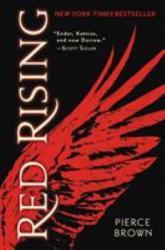
It is difficult to review a book like Red Rising without noting the heavy comparisons to The Hunger Games. Perhaps this speaks to the strength of The Hunger Games’ format, but there are almost too many parallels to ignore. Dystopian class-separated society? Check. A skilled lower-class individual who defies the odds? Check. Violence and a romantic subplot? Check and check. About the only difference between the two is that Red Rising takes place on Mars and over a few years instead of a week or so. Of course, it’s hard to tell the timespan since important details always seem to be missing from the first-person narrative.
If anything, I’d peg Red Rising as the gritty, over-violent, and over-sexualized version of The Hunger Games. If The Hunger Games appeals to girls and women, Red Rising should appeal to boys and men. A lot of the content in this book felt a bit over the top and unnecessary to the plot. Granted, the action was pretty well written, and at least a few of the characters seemed to have their distinct personality. I didn’t care for the more “aware” portions of the prose, as they seemed out of place in a “look how flowery I can write this simple scene” sense.
Another split from The Hunger Games comes in the form of the main character. While Katniss subjected herself to the brutality selflessly and sacrificially, Darrow was solely focused on a simple-minded goal: vengeance. Consequently, while I could understand Darrow’s motivation, it failed to have many nuances. It ended up being so repetitive that I rolled my eyes every time he brought up his past. Still, there were a few good twists and some great character development through this volume. There’s enough of setup at the end of this book that I’m curious where Golden Son takes the story.
A male-oriented knock-off of The Hunger Games, I give Red Rising 3.5 stars out of 5.
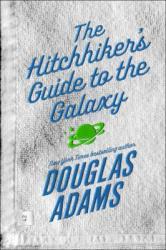
Five stars (If you don’t laugh at this, then I don’t know what cave you’ve been living in) The HitchHiker's Guide to the Galaxy is a sci-fi comedy so specific that it is funny. Between the absurd circumstances and the very specific jokes, I couldn’t stop laughing. The start of the book is normal, but once you get into it it keeps you laughing as it gets weirder and weirder. The events that happen are so improbable that it turns it the other way and makes it very probable. When reading the Guide, don’t forget your towel!
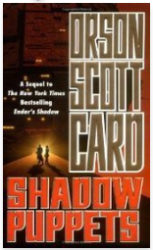
It’s odd for me to read the third book in a series and be confronted with
problems that I usually see by the fourth book. So far, I’ve been on board
with the whole Shadow series as it focuses on an interesting character in the
form of Bean. For two books, I’ve read about Bean’s survival, made all
the more thrilling by the antagonist Achilles. Of course, during Ender’s
Shadow and Shadow of the Hegemon , the series picked up plenty of side
stories and sub-plots. This is what ruined Shadow Puppets for me: the focus
wasn’t on Bean and Achilles, but rather on advancing the story of all these
sub-plots.
Now, don’t get me wrong, Shadow Puppets has a lot of interesting events.
It’s just that it was so entertaining to read about Achilles in the
previous books, and he’s relegated to a bookending motif for this book. We
don’t get to see him directly interact with others, instead of having the
main characters always wondering how he’ll react to their attempts to trap
him. This kind of “telling” instead of “showing” really rubbed me the
wrong way and made the climax of this story (let alone the first three books)
feel quite anticlimactic.
I do appreciate some of what Card does with these well-rounded characters,
and I want to see what happens next with a world in such turmoil and
turnover. And yet, with how unfocused this book was, I don’t know if I want
to get my hopes up for the next books in this series. After all, the central
conflict of the previous two books is now behind Bean, which makes me wonder
what could replace such a heart-pounding game of cat-and-mouse. There are
plot threads to follow into the next book, but I could probably predict what
happens just based on the foreshadowing contained in this book.
An unfocused and slightly anticlimactic conclusion to one of the best
antagonists, I give Shadow Puppets 3.0 stars out of 5.
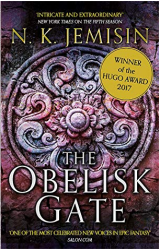
I’ll admit that reading The Fifth Season had a bit of a learning curve for
the Broken Earth series. Not only did I have to learn about the vastly
powerful magic system based on rocks (and other rock forms), but I had to get
used to a second-person point of view (POV). Jumping between timelines with
similar characters who had different names was a bit confusing, but I was
able to figure it out by the end. Fast forward to the sequel, The Obelisk
Gate, and most of my qualms with the first book were smoothed over or solved
outright.
One of the things I enjoyed about The Obelisk Gate was the increase in the
scale of the magic system. Including the moon in these calculations makes
perfect sense considering the nature of the orogeny magic. I also appreciated
how the story seemed to focus on a single POV, which made for a more intimate
experience as we followed only one or two individuals instead of four. Now
that I was used to the second-person writing style and the character it
described, it didn’t bother me as much as when I read The Fifth Season.
While The Fifth Season set up the world-building for this trilogy, The
Obelisk Gate’s only weakness is that it finally set up the climactic plot
for the third book. Sure, there was plenty of character development and
intriguing twists in the plot in The Obelisk Gate, but they all seemed to be
hinting at something much more significant that wouldn’t take place in this
book. I do appreciate an excellent three-act structure, so this slight
weakness can be seen as merely an artifact of the second book in a trilogy.
In fact, because it was more focused, I liked this book more than its
predecessor. After all, it’s a strong concept with solid execution.
A focusing and foreshadowing of the Broken Earth series, I give The Obelisk
Gate 4.5 stars out of 5.
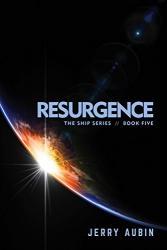
Jerry Aubin finishes the Ship Series in spectacular fashion. In Resurgence, Aubin ties up the series beautifully and answers all of the questions that have kept readers fascinated from the very beginning. Zax must finally face what he started and defeat the true enemy of the ship, Alpha. Resurgence will keep you on your toes with its whirlwind plot that will captivate you from the start. Like all of its predecessors, Resurgence does not disappoint with its plot twists and adventures. I highly recommend this book for any middle or high school aged reader.
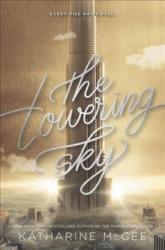
"The Towering Sky" by Katherine McGee tells the story of five teenagers in 2119. Living in a futuristic Manhattan tower in which your floor displays your power, a mystery/romance story is bred. This book was perfectly okay. The writing wasn't half bad, and the characters ,well half-baked, were not unrealistic or arrogant. However, as reading this book, the third and final of a series, without reading the first two, was extremely confusing. At first I had not realized that this book was part of a trilogy, and thought the writing was purposefully confusing. Though I don't know if this book would make more sense after reading the first two, the pacing was quite fast, though the plot moved slow, which created a strange vibe while reading. In general, I would not recommend this book. However, if you have read the first two and liked them, go ahead and give it a go.
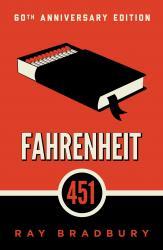
Fahrenheit 451 follows the story of a fireman, Guy Montag, who lives in a dystopian society. His job as a fireman is to locate all books around the city and burn them. Books are banned from any individual and is considered to be an inferior type of entertainment in comparison television, which are more supported by the public. As Montag continues to burn more books throughout his job over time, he deals with a variety of external factors that changes his brainwashed and disillusioned perspective to considering books and their significance to society. Being a firemen in this dystopian society, Montag must deal with a plethora of barriers that are blocking his way before he can truly understand the importance of books and to keep them.
Fahrenheit 451 is an intriguing book that takes a different approach in a dystopian society. Instead of implementing a militaristic and governmental style, Bradbury uses firemen which encapsulates a unique and captivating plot line. Fahrenheit 451 demonstrates a story that everyone can enjoy, especially for those who enjoy reading dystopian novels. Bradbury effectively relates character development of Montag to the series of events that occurs. This coherent relationship that virtually happens side-by-side further produces a sense of immersion for the reader.
Personally, I enjoyed Bradbury's Fahrenheit 451 novel. It is considered to be one of his best, and most iconic books that he has written to date. I highly recommend any average reader to consider reading Fahrenheit 451. The book is not too long, but it will still produce an immense amount of quality and satisfaction in the end.
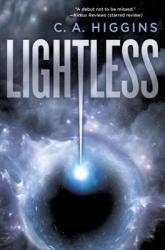
***THIS BOOK WAS RECEIVED FROM THE PUBLISHER***
There seem to be a few cardinal sins most writers are cautioned to avoid at all costs. Two of these sins are exposition dumps and “show, don’t tell.” While the entire book doesn’t necessarily fall into these pitfalls, Lightless spends a big chunk of its 300 pages in telling the reader about all the exposition to the story that’s currently playing out. Instead of reading an interrogation, I would have much rather seen the events that led to the current state of the solar system. On top of all this, I failed to care about any of the characters or their plights because this method of storytelling was so impersonal.
I’ll admit that I almost gave up reading this book right before it became interesting again. The ending does a pretty good job of re-invigorating the plot, but it might be a case of too little too late. Furthermore, not only were there plenty of weird logical leaps, accents that were told to the reader but not shown in dialect, and actions that didn’t make much sense, but there was almost too much coincidence in the appearance of certain characters. The fact that I thought it would have been a more interesting story if the System interrogator was the terrorist all along, coming to tie up loose ends, says something about the standard nature of the plot.
In the end, this book suffers from being the first of an intended trilogy, as well as being this author’s first work. The amount of exposition crammed into this book is merely a setup to something that’s likely more interesting to read, not that I’ll continue with this trilogy. Additionally, there were quite a few times where the awkward wording of a sentence or the repetition of a particular word pulled me out of the narrative. Finally, I felt it took way too long for the computer specialist to figure out what the problem was. The clues were evident almost from the start, but she only “got smart” about it when the plot demanded it.
An interesting climax that required an expositional slog to get to, I give Lightless 2.0 stars out of 5.
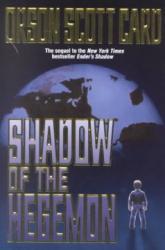
It’s almost fitting how the follow-on book in the spin-off series to Ender’s Game takes the same tactic as Speaker for the Dead and transforms itself into a completely different genre. While Speaker for the Dead and its sequels still maintained a level of science fiction for the Ender saga, Shadow of the Hegemon pivots into a political thriller with almost no hints of sci-fi to be seen. The strength of the characters helped make this transition relatively smooth, but it still highlights how these child-aged individuals hardly have any child-like qualities.
While the Shadow saga certainly needed to start out focusing on Bean, I did appreciate how Shadow of the Hegemon developed many of the supporting characters. For the first time in both series, I felt like the reader was able to know Petra and Peter while also seeing what Achilles was capable of accomplishing. The results of bringing back children war heroes to Earth had a logical feel to its progression, even if I didn’t really care much about southeastern Asian politics to really engage with the politics of the plot. That’s not to say the whole “cat and mouse” between Achilles and Bean wasn’t interesting; it just wasn’t what had brought me to this series in the first place.
Of course, having read the Ender saga first, I can already see the early ripples of how this side-series will start to wrap up. Now that Ender is less of a presence in the Shadow series, other characters finally have a chance to show what they can do. While I’ll reserve my predictions might change with what actually happens, I get the sense that Peter’s tenure as Hegemon changes the world just as Bean changes into some super-intelligent giant. I will admit that some of Orson Scott Card’s predictions from 2000 still seem plausible today, given the political climate, it’s clear that the author did his research before playing with the ever-important sci-fi “what if” scenario.
A political pivot from a well-known sci-fi series, I give Shadow of the Hegemon 4.0 stars out of 5.
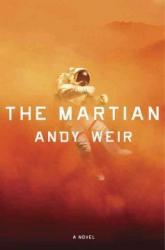
After a NASA crew member is left behind on planet Mars, he has a huge to-do list. First, come in contact with NASA to prove he is alive, don't starve, don't die, then make it home alive. I'm not a huge fan of any science fiction type book, however, this was indeed an exception. I loved the perspectives the author chose to include, and the humor he shot into his characters gives the story personality. I suggest this book to an eighth grade audience; there is some inappropriate language and all of the science attributes are complex to understand. I strongly suggest to you this book if you want to be left on the edge of your seat with every new chapter, right up until the end.
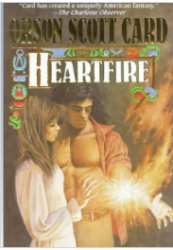
It’s been a while since I read this far into a series, and I can start to see why I like trilogies and stand-alone books. If I didn’t know any better, I’d think this series had evolved into a courtroom drama instead of a historical fantasy. At this point, the whole premise of this series seems to have veered off course and has lost its focus to tackle unrelated issues that were somewhat prominent at the time. Or, at least it’s merely acting as a chance to name drop historical figures and take the side of history against well-known issues that haven’t aged well over time. If anything, Heartfire could have easily been the fourth book in the series, since Alvin Journeyman added nothing to the story. Even so, Heartfire didn’t feel as strong as earlier books in the series. It almost seems like there’s more of a focus on world-building. There is less focus on actually progressing the story—like the path toward the Crystal City. Certain plot elements were almost entirely forgotten as well, even if there was a whole legal battle in the last book to re-hash how Alvin came into possession of a sentient golden plow (which itself is still unclear why it’s important).
By now, I’m merely reading the series on autopilot just to see if there is any conclusion to the alternate history presented here. I still think there are clever takes on historical figures, but by now, they seem added in as a heavy winking nod to the reader, most of whom will already know the referenced individual. Perhaps the lack of overall character growth in this book is what made it such a so-so read for me. Sure, there were baby steps toward some redemption arc, but in the end, nothing ended up changing the drive of the overarching story.
Another weak link in the Alvin Journeyman series, I give Heartfire 3.0 stars out of 5.


